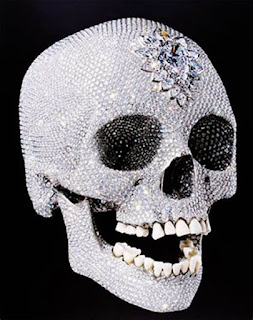Mid or Post-Modern Blog
Andy Warhol, Damien Hirst, and Barbara Kruger are three artists who are often associated with the Postmodern Art Era, which emerged in the late 20th century as a reaction against modernism. Postmodernism is characterized by a rejection of grand narratives, a focus on the everyday, and an emphasis on the role of language and media in shaping our understanding of reality.
Andy Warhol was one of the pioneers of Pop Art, a movement
that emerged in the 1960s and was characterized by its use of popular culture as
subject matter. One of Warhol's most famous works is his series of Campbell's
Soup Cans, which consists of 32 canvases, each depicting a different flavor of
soup. The art elements Warhol uses in this work are color, repetition, and
contrast. The repetition of the soup cans creates a sense of uniformity and
mass production, while the use of bright, bold colors creates a striking
contrast against the white background. The placement of the cans in a grid
further emphasizes their uniformity and highlights the role of commercialism in
shaping our culture.
Another iconic work by Warhol is his series of Marilyn
Monroe portraits, which depict the actress in a range of colors and styles. In
these works, Warhol uses the art elements of color, line, and contrast. The use
of bright colors and bold lines creates a sense of energy and movement, while
the contrast between the different portraits highlights the fleeting nature of
fame and the role of media in shaping our perceptions of celebrities.
Damien Hirst is another artist who has been associated with
the Postmodern Art Era, particularly for his use of unconventional materials
and subject matter. One of Hirst's most famous works is his series of
formaldehyde-preserved animals, including sharks and cows. In these works,
Hirst uses the art elements of texture, form, and contrast. The texture of the
preserved animals creates a sense of eeriness and discomfort, while the use of
form and contrast highlights the fragility of life and the role of science in
shaping our understanding of the natural world.
Another iconic work by Hirst is his diamond-encrusted skull,
titled For the Love of God. In this work, Hirst uses the art elements of form,
light, and contrast. The form of the skull creates a sense of mortality, and the
use of light and contrast creates a sense of glamour and extravagance, which
challenges the traditional associations of death and decay.
Barbara Kruger is known for her use of text and image in her
works, which often comment on the role of media and power in our society. One
of Kruger's most famous works is her image of a woman with the text "Your
body is a battleground" overlaid on top. In this work, Kruger uses the art
elements of contrast, placement, and emotion. The use of contrast between the
image and text creates a sense of tension and the placement of the text over
the woman's body emphasizes the political nature of the work. The emotional
impact of the work is powerful, highlighting the ongoing struggle for women's
rights and control over their bodies.
One common topic shared by Andy Warhol, Damien Hirst, and
Barbara Kruger in regard to the Post-Modern Art Era is the critique of consumer
culture and the commodification of art. Warhol's iconic Campbell's soup cans
and Hirst's preserved animals in formaldehyde challenge the traditional notions
of what constitutes art and what can be bought and sold in the art market.
Kruger's bold, text-based works question the power structures and gender roles
perpetuated by mass media and advertising. All three artists use pop culture
imagery and techniques to subvert the dominant cultural narratives and reveal
the underlying mechanisms of capitalist society.
Bibliography
Acadamy, Khan. n.d. Damien Hirst, The Physcial
Impossibility of Death in the Mind of Someone Living. https://www.khanacademy.org/humanities/global-culture/concepts-in-art-1980-to-now/x247213a3:young-british-artists/v/hirst-s-shark-interpreting-contemporary-art.
Lizcano, Margartia. 2022. Art on Artists: Barbara
Kruger. https://www.moma.org/artists/3266.
Museum, The Andy Warhol. 2023. the warhol: Andy
Warhol. https://www.warhol.org/andy-warhols-life/.
Selvin, Claire. 2020. Barbara Kruger's Strange,
Alluring Text-Based Artworks: How the Artist Critiqued Advertising and Rose to
Fame. https://www.artnews.com/feature/barbara-kruger-art-exhibitions-1202696145/.







Hello Tamrit! Amazing blog post about extremely insightful artwork, one piece that looks very nice to me is "I Shop therefore I am" The retro feel filled in the red lines works perfectly, the contrast on the hand is also done very well which makes this look very realistic. Within post modern art there are many great themes that make up this great era. The biggest theme I see within all these images are change, the boldness mixed in with sharp colors and lines grab my attention very well which portrays the importance of these pieces. The unconventional use of cloning and asymmetry depict the chaos of what is going on in the times of post modern art. Great Job!
ReplyDeleteHi Tamrit, I enjoyed your blog. I also found the works you chose to comment on very insightful on how artists were challenging the norms of the art world. I also noticed that on the series of Campbell's Soup Cans, you said that the bold colors on the cans stand out, which I noticed when combined with the less noticeable bottom halves, gives a feeling that the upper halves are closer to us and makes them pop out.
ReplyDelete